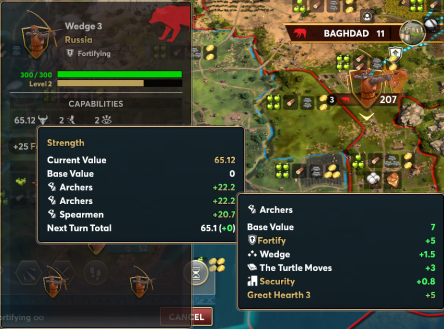Force Strength: Difference between revisions
Added a breakdown of example bonuses that will need additional edits |
m Z0eff moved page Combat Power to Force Strength |
||
| (3 intermediate revisions by the same user not shown) | |||
| Line 1: | Line 1: | ||
Overview | == Overview == | ||
Combat Power is a statistic that exists as an abstraction of martial skill and to some extent stamina. Every player will start with a Scout. A Scout is a Specialist but is still a unit. Specialists like Paragons are usually mean to be individuals, but sometimes are a group like Settlers. Most units are usually a military task force specific to land or naval operations. Depending on the research you've done the land units will be able to mock together or 'enlist' ships for transporting themselves over bodies of water. When you muster a Specialist they'll spawn in the city center which you built them in. When you muster military units you do so as a force - organizing them before you muster them into different sizes and fighting formations by using the Tactics drop down menu in the Mustering menu. You can muster a force that is a single unit. | Combat Power is a statistic that exists as an abstraction of martial skill and to some extent stamina. Every player will start with a Scout. A Scout is a Specialist but is still a unit. Specialists like Paragons are usually mean to be individuals, but sometimes are a group like Settlers. Most units are usually a military task force specific to land or naval operations. Depending on the research you've done the land units will be able to mock together or 'enlist' ships for transporting themselves over bodies of water. When you muster a Specialist they'll spawn in the city center which you built them in. When you muster military units you do so as a force - organizing them before you muster them into different sizes and fighting formations by using the Tactics drop down menu in the Mustering menu. You can muster a force that is a single unit. | ||
Currently mustering a Unit or Force will spawn them in the city center like a Specialist would. When you muster military units they'll be associated with that city's Security rating. Even when moved out of the city boundaries that unit's strength will be affected by it's home city's current | Currently mustering a Unit or Force will spawn them in the city center like a Specialist would. When you muster military units they'll be associated with that city's [[Security]] rating. Even when moved out of the city boundaries that unit's strength will be affected by it's home city's current [[Security]] rating. You can support a number of forces based on what act or research you've completed. Currently forces can not be upgraded after mustering them. While a common enough feature in most 4X games there may be a system to upgrade units which are in your reserve. Presently this pressures players to create as large a force as possible to maximize the strength. | ||
Force Strength | == Force Strength == | ||
All Forces have a cumulative Strength (bull-icon), which is based on the sum of the Strength of Units in their Formation (aka, tactic). This clearly shows how big and scary it is - the higher the number, the stronger it is. This strength can and will change for a given Force as it takes Damage, has Buffs applied, etc. In general you want to bring a evenly matched, or higher Strength (bull-icon) force to bear on enemy forces. One way to do this is to coordinate movement of units together as an Army. An Army in this case will mean you have more than one unit in a region. This may be proverbially called a stack of units, popularized by strategy games in which you stacked multiple square chits together. Your forces are assumed to work well together and will usually self organize as one single Army (aka Stack) if they engage with or are attacked by an enemy Force or Army. | All Forces have a cumulative Strength (bull-icon), which is based on the sum of the Strength of Units in their Formation (aka, tactic). This clearly shows how big and scary it is - the higher the number, the stronger it is. This strength can and will change for a given Force as it takes Damage, has Buffs applied, etc. In general you want to bring a evenly matched, or higher Strength (bull-icon) force to bear on enemy forces. One way to do this is to coordinate movement of units together as an Army. An Army in this case will mean you have more than one unit in a region. This may be proverbially called a stack of units, popularized by strategy games in which you stacked multiple square chits together. Your forces are assumed to work well together and will usually self organize as one single Army (aka Stack) if they engage with or are attacked by an enemy Force or Army. | ||
| Line 14: | Line 14: | ||
# Base Strength - we can see on the right the first value is 7. Archers have a base value of 6 when built, but have a base value of 7 at level 2, thus this amount. | # Base Strength - we can see on the right the first value is 7. Archers have a base value of 6 when built, but have a base value of 7 at level 2, thus this amount. | ||
# Fortify - this unit has been commanded to fortify <unsure of calculation, needs additional info> | # Fortify - this unit has been commanded to fortify ''<unsure of calculation, needs additional info>'' | ||
# Wedge - the units receives +10% strength (x2 for each archer?) for being in a wedge <verify> | # Wedge - the units receives +10% strength (x2 for each archer?) for being in a wedge ''<verify>'' | ||
# Religion Bonus - custom religion "The Turtle Moves" has a verse providing +3 strength. | # Religion Bonus - custom religion "The Turtle Moves" has a verse providing +3 strength. | ||
# Security - This unit was deployed in Moskva, which currently is in the 60-69 range in its security QOL, providing a 10% bonus. (7*0.1=0.7, not 0.8). <The math aint mathing. Needs additional clarity> | # Security - This unit was deployed in Moskva, which currently is in the 60-69 range in its security QOL, providing a 10% bonus. (7*0.1=0.7, not 0.8). ''<The math aint mathing. Needs additional clarity>'' | ||
# Finally, Baghdad is a capital which has a Great Heath improvement on it. This provides +5 strength to all units defending. | # Finally, Baghdad is a capital which has a Great Heath improvement on it. This provides +5 strength to all units defending. | ||
These amounts total up to the 22.2, with a difference due to rounding. | These amounts total up to the 22.2, with a difference due to rounding. | ||
Latest revision as of 15:20, 11 October 2024
Overview[edit | edit source]
Combat Power is a statistic that exists as an abstraction of martial skill and to some extent stamina. Every player will start with a Scout. A Scout is a Specialist but is still a unit. Specialists like Paragons are usually mean to be individuals, but sometimes are a group like Settlers. Most units are usually a military task force specific to land or naval operations. Depending on the research you've done the land units will be able to mock together or 'enlist' ships for transporting themselves over bodies of water. When you muster a Specialist they'll spawn in the city center which you built them in. When you muster military units you do so as a force - organizing them before you muster them into different sizes and fighting formations by using the Tactics drop down menu in the Mustering menu. You can muster a force that is a single unit.
Currently mustering a Unit or Force will spawn them in the city center like a Specialist would. When you muster military units they'll be associated with that city's Security rating. Even when moved out of the city boundaries that unit's strength will be affected by it's home city's current Security rating. You can support a number of forces based on what act or research you've completed. Currently forces can not be upgraded after mustering them. While a common enough feature in most 4X games there may be a system to upgrade units which are in your reserve. Presently this pressures players to create as large a force as possible to maximize the strength.
Force Strength[edit | edit source]
All Forces have a cumulative Strength (bull-icon), which is based on the sum of the Strength of Units in their Formation (aka, tactic). This clearly shows how big and scary it is - the higher the number, the stronger it is. This strength can and will change for a given Force as it takes Damage, has Buffs applied, etc. In general you want to bring a evenly matched, or higher Strength (bull-icon) force to bear on enemy forces. One way to do this is to coordinate movement of units together as an Army. An Army in this case will mean you have more than one unit in a region. This may be proverbially called a stack of units, popularized by strategy games in which you stacked multiple square chits together. Your forces are assumed to work well together and will usually self organize as one single Army (aka Stack) if they engage with or are attacked by an enemy Force or Army.
Example breakdown of a Level 2 Archer's strength in a game:

- Base Strength - we can see on the right the first value is 7. Archers have a base value of 6 when built, but have a base value of 7 at level 2, thus this amount.
- Fortify - this unit has been commanded to fortify <unsure of calculation, needs additional info>
- Wedge - the units receives +10% strength (x2 for each archer?) for being in a wedge <verify>
- Religion Bonus - custom religion "The Turtle Moves" has a verse providing +3 strength.
- Security - This unit was deployed in Moskva, which currently is in the 60-69 range in its security QOL, providing a 10% bonus. (7*0.1=0.7, not 0.8). <The math aint mathing. Needs additional clarity>
- Finally, Baghdad is a capital which has a Great Heath improvement on it. This provides +5 strength to all units defending.
These amounts total up to the 22.2, with a difference due to rounding.

